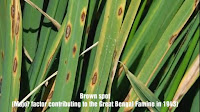This is the season of paddy, lets know about fungal disease of paddy and their management.
Are you seeking for the solution of fungal disease in your paddy fields🤔🤔?? .....Increase production of paddy in your field by reading 😯 😯😯 solution in this blog.
Some important fungal disease of paddy are listed below:
Fungal disease
- Blast (leaf and collar) (Fungus magnaporthe oryzae)
- Brown spot
- False smut
- Sheath blight(Rhizoctonia solani)
- Leaf scald (Microdochium oryzae)
- Narrow brown spot / cercospora leaf spot
- Red strip
- Bakanae
- Sheath rot (Sarocladium oryzae)
- Blast (node and neck) (Fungus magnaporthe oryzae)
1. Blast
A recent report show that blast can affect even roots. Mostly the symptoms of blast can be observe on leaf, leaf collar, neck, panicles, pedicels and seeds.Lesion are found on all most all part of plants.
Management
- Plant resistant variety.
- Avoid excessive use of fertilizer, specially nitrogen. Use nitrogen in split dose.
- Flood the field as often as possible.
2. Brown spot
Brown spot are present on leaf, pedicels. Due to of this fungal disease in 1943 great Bengal famine was caused.
Management
- Improve soil fertility.
- Monitor soil nutrient regularly.
- Use resistant variety.
- Treat seed with hot water (53 - 55 C) For (10- 12 min.) Before planting to control primary infection at seedling stage.
- To increase effectiveness of treatment pre-soak seeds in cold water for 8 hours.
3. False Smut
Smut ball present on spikelets. Spore ball are initially orange in colour and slowly turns greenish black. it directly it affect the grain and rice ball.
Management
- Keep the field clean.
- Remove infected seeds, panicles, and plant debris after harvest.
- Reduce humidity levels by alternate wetting.
4. Sheath blight
Sheath blight has symptoms similar to stem borer and stem rot infestation. To confirm the cause of disease we need to check the irregular lesions usually found on the leaf sheaths.
Management
- There is no resistant variety of sheath blight.
- Use fungicide to treat seed.
- Maintain proper spacing.
- Keep field clean.
- Use appropriate amount of fertilizer, specially Nitrogen.
5. Leaf scald
The affected areas dry out giving the leaf a scalded appearce. immerse cut leaves in clear water for (5-10 min), if no ooze come out,then it is leaf scald.
Management
- Use resistant variety.
- Avoid high use of fertility.
- In field spray with benomyl, fentin acetate.
- Folliar application of captafol, mancozeb and copper oxychloride also reduce severity of the fungas disease.
- To prevent pathogen survival across cropping season.
- Remove weeds.
- Plough under of rice stubbles.
- Remove infected rice ratoons.
Rest of remaining disease will be discuss in upcoming blog.
👉👉 You should also watch bacterial and viral disease.👈👈
👇👇
Let's know bacterial and fungal disease of rice












No comments:
Post a Comment